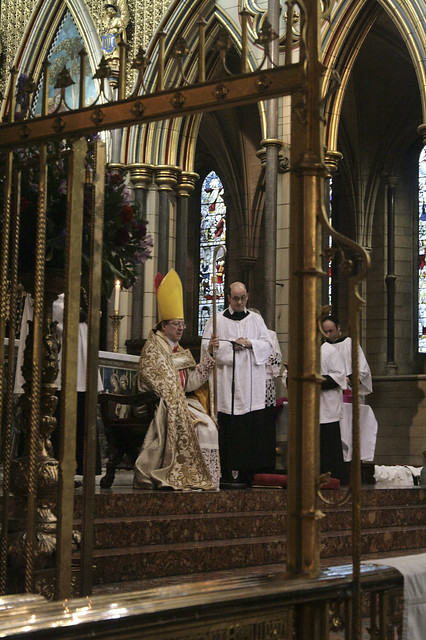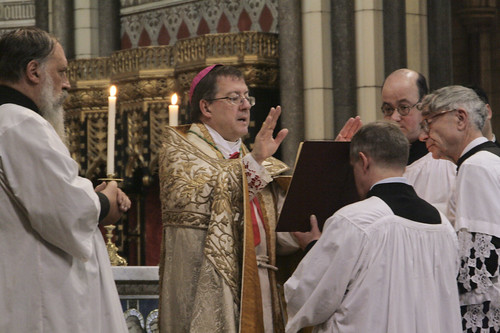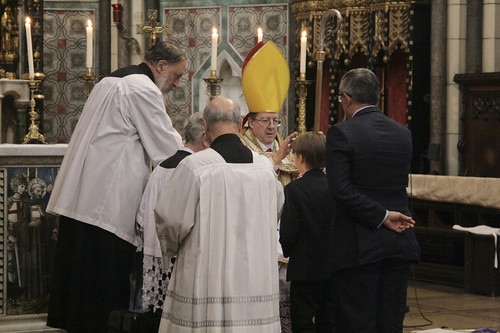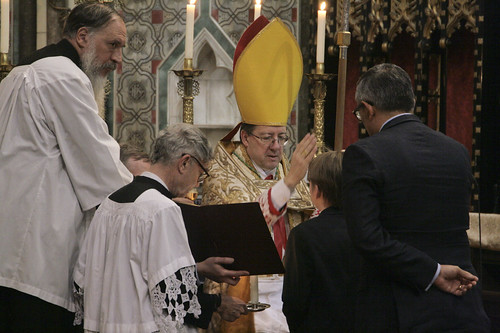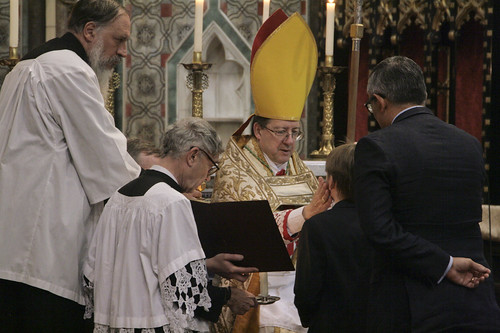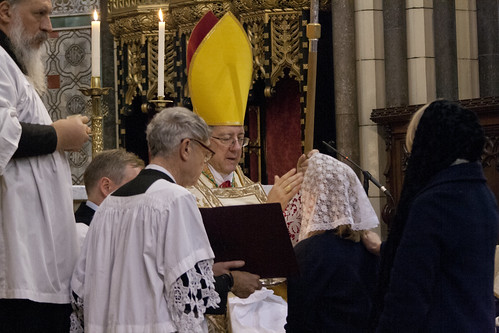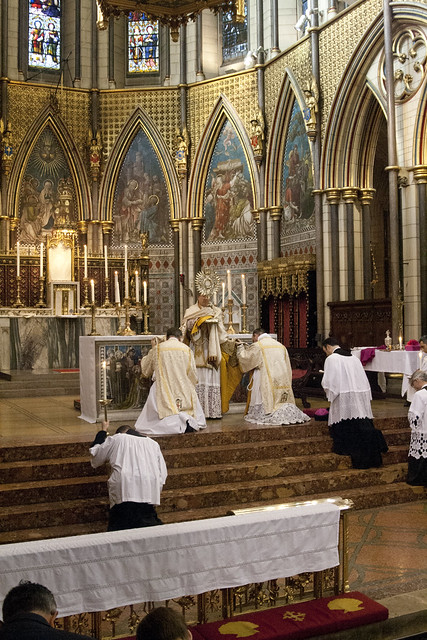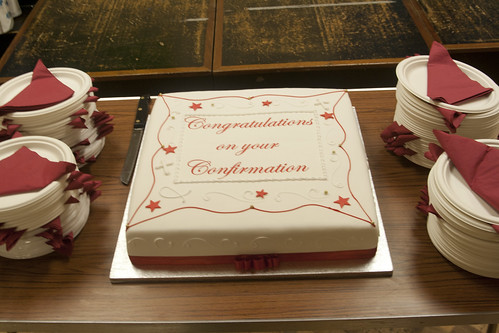Chairman's Blog
LMS in London: new email list
The Latin Mass Society is planning some new initiatives in the London area, and there is already quite a lot happening in the capital, so we are launching an electronic newsletter just for London.
We already have one for the whole of England and Wales: you can sign up to that one here.
You don't have to be a member to join our email lists, and you don't have to live in London for this one: you may be an occasional visitor or simply interested to know what's going on. (Joining the London list won't automatically add you to the national list, so do consider signing up for both.)
We won't bombard you with emails: our plan is for a monthly email newsletter, though we may send the occasional urgent update when necessary.
LMS members in the London area who have agreed to be contacted by email are on the list. If you're not sure if this includes you, add your email address: duplicate entries are automatically merged.
Your information will only be accessible to our staff and Local and Assistant Representatives, in order for them to carry out their role in line with our Privacy Policy. We will never sell your personal information, or let other organisations use it for their own purposes.
After entering your email below and clicking subscribe, you will be sent a message to confirm your subscription. You may unsubscribe at any time by following the unsubscribe link in your newsletter.
Today's sexual culture is failing our young people
The headmaster of a smart London school once warned me about being too forthright when giving a talk there. “Young people today feel under tremendous pressure,” he said. I understood what he meant. They feel under pressure to do things they do not feel comfortable doing, such as engaging in premature sexual activity, or in particular sexual acts. They also feel pressure not to agree to do them. Were someone to put more pressure on them not to do such a thing, whether the pressure was emotional or intellectual, it would feel unbearable, because it makes it harder for them, it raises the emotional cost for them, to give in to the strongest pressure.
There is a cost to saying yes, and a cost to saying no. Raising the cost of saying yes may, possibly, succeed in tipping the balance. But in itself it does nothing to lower the cost of saying no, which must be paid in full: in bullying, marginalization, ostracism, and even physical violence.
Don't do your online shopping till you've read this
It came as a surprise to me, and may be to you too, that you can support your favourite charity when shopping online in a very simple way without any cost to you.
There are two ways of doing this:
One is called 'easyfundraising'. If you visit your usual online retailers through the easyfundraising site, or using the easyfundraising app, having told easyfundraising which charity you wish to support,(i.e. the Latin Mass Society, Registered Charity 248388) a great many of them will make a small donation to your charity if you buy something.
Just visit the easyfundraising site and all will be explained. The donations vary in size; some are fixed sums, some are percentages. It's not much but it adds up. If thousands of UK Catholics consistently did their shopping this way in favour of the Latin Mass Society, it would raise a very real sum of money. The other way is Amazon doing this themselves in a way which is even simpler for the user. Instead of going to Amazon.co.uk, go to https://smile.amazon.co.uk. It looks exactly the same, you'll log into your account as usual, but once you've told them who to donate to, (i.e. The Latin Mass Society Registered Charity 248388) they'll donate every time you buy something. (It also works with Amazon.com, but you have to choose a charity from the USA).
The other way is Amazon doing this themselves in a way which is even simpler for the user. Instead of going to Amazon.co.uk, go to https://smile.amazon.co.uk. It looks exactly the same, you'll log into your account as usual, but once you've told them who to donate to, (i.e. The Latin Mass Society Registered Charity 248388) they'll donate every time you buy something. (It also works with Amazon.com, but you have to choose a charity from the USA).
How much does Amazon give? Half of one percent of the value of your purchase. (It's exactly the same if you shop on Amazon via easyfundraising.) Again, it's not much, but it adds up. You could easily end up contributing more, over a year, to the Latin Mass Society (or whoever) through shopping online, than you do through a standard annual membership or regular donations.
Why do the retailers do this? Because as good corporations they give a certain amount of their profits to charity, and this is a way to let their customers choose the charity, as well as giving those customers an extra reason to use them.
Think of the hideous causes they might otherwise support with your money! Put it to a good use. Support the LMS!
Oh, but obviously use the Latin Mass Society's online shop for preference, filled as it is with books, cards, and devotional gifts of all kinds.
Support the Latin Mass Society
Explaining and defeating Political Correctness' spiral of lunacy
My latest on LifeSite News. A key passage:
Read it all here.
Clericalism and abuse
My latest on LifeSite News.
A key passage:
Catholic Bishops are afraid of investigations
My latest on LifeSite News.
A taster:
In some cases, decision-makers were personally involved in wrongdoing. In other cases, it is sometimes suggested, they were being black-mailed, explicitly or implicitly. I would suggest, however, that this is another motive, which would apply even to those who had little to fear personally: simply that a real house-cleaning exercise would implicate so many people, in such seriously bad things, that the overall effect on the Church’s standing, and even its ability to function, would be catastrophic.
Read it all here.
LMS Confirmations 2018: Photos
Every year the Latin Mass Society organises confirmations in the Extraordinary Form in St James', Spanish Place, in London. They are usually conferred by an auxiliary bishop of the Archdiocese of Westminster. This year, for the third time, it was Bishop John Sherrington.
Each candidate is annointed, given the sacramental formula, and then the ritual blow on the cheek. Bishop Sherington spoke movingly about the symbolism of this blow, as showing that the confirmand must be willing to die for the Faith.
The confirmations were followed by Pontifical Benediction.
And cake, of course!
A Catholic culture? We need a culture
Me on LifeSite News. A key passage.
Should Catholics be free-speech absolutists?
Me on LifeSite News: a key section.
Since people on the “progressive” side of the debate generally need not fear exclusion from social media and public spaces, they usually do not need to make such appeals, so this appeal to free speech is becoming increasingly associated only with the defense of conservative voices. We now hear from liberals that the principle of free speech is being “weaponized,” a rhetorical preparation for saying that the principle should be rejected, as the latest Google memo comes close to doing.
This is quite a turn-around from the depiction of the Catholic Church as the opponent of liberty, and the historic attempts to undermine the Church’s institutions and influence by scurrilous pamphleteering: characteristic tactics of the Church’s opponents since the time of Luther. In response to this kind of activity, Popes down the ages remind us that freedom of expression is not an absolute right. Typical was Pope Pius IX, who had the Papal States to administer as well as the Universal Church, and who wrote in 1864 (Quanta cura) of “that erroneous opinion”
that a right resides in the citizens to an absolute liberty, which should be restrained by no authority whether ecclesiastical or civil, whereby they may be able openly and publicly to manifest and declare any of their ideas whatever, either by word of mouth, by the press, or in any other way.
Read it all there.
Honouring our war dead
Me on LifeSite News. A key paragraph:
There are inevitably those who are uncomfortable with the commemoration of the war dead, the commonest complaint being that it ‘glorifies war’. This seems a curious reaction to the ritualized expression of public grief, but it contains this grain of truth: the laying of wreaths and the parading of soldiers does not merely remember the dead: it honors them. If one takes the view that all war is evil, then this is no more appropriate than publicly honoring a roll-call of mass-murderers.

